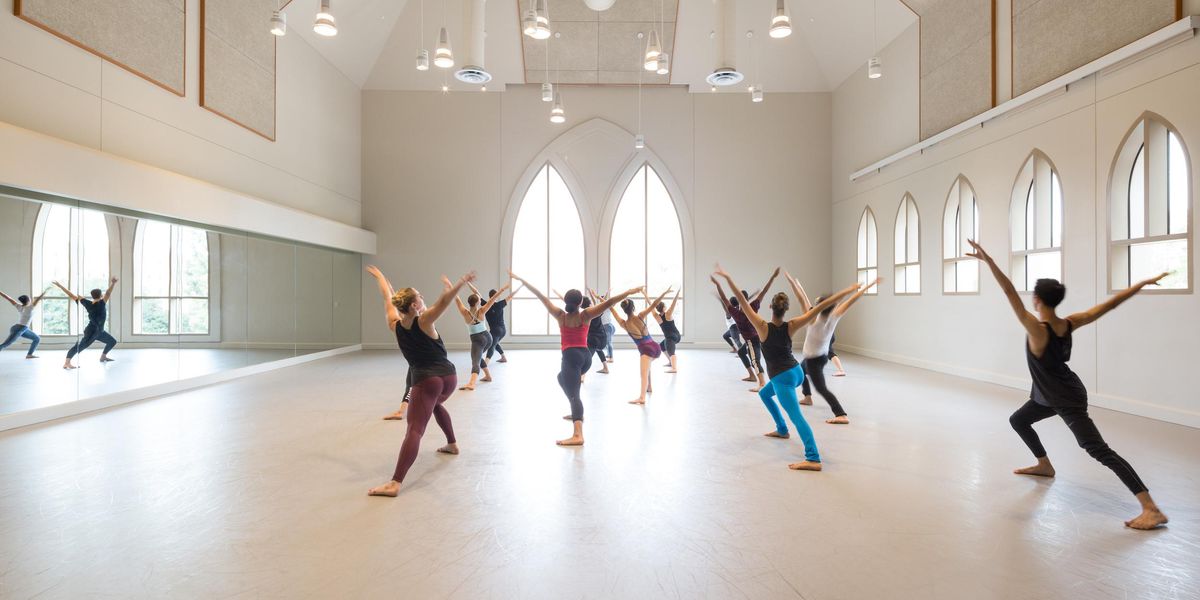On Broadway: He's Got Rhythm
Nice Work’s high-flying Robert Hartwell
Hartwell takes off in the second act’s “Lady Be Good.” Photo by Joan Marcus, Courtesy
Nice Work.
Read Robert Hartwell’s eight-line bio in the Playbill for Nice Work If You Can Get It, and questions pile up. Plenty of Broadway dancers have college degrees, but magna cum laude? Most have some ballet training, but in Hungary? The Lord often gets shout-outs, but obscure Biblical citations (Philippians 1:6)? And why does the bio close with “This one’s for Nana,” just like his first one, when he took over the role of Wailin’ Joe in Memphis?
The answers turn out to be a single—and singular—story of faith, family, and serendipity. It begins in Raleigh, North Carolina, when a divorced mom takes her two sons to a free show, and ends with one of them going on to study ballet and musical theater and then to win an Astaire Award nomination for his standout dancing in the Nice Work ensemble.
“My mom was the Tiger Cub den leader,” Hartwell says, “and one of the activities was to take the kids to a cultural event. Our community theater had this free performance. I was 7, and my mom will tell you that my eyes just lit up like crystal balls. She had to peel me out of the theater.” The pamphlets they took listed theater classes for kids, and, says Hartwell, “I didn’t even have to beg. My mom knew something had happened.”
For his ninth birthday, his mother took him to Baltimore to see Cats. The following year, he saw an ad in the local paper: Kirstie Tice, whom he had seen as Victoria, the white cat, was teaching at a new dance studio. “I told my mom, ‘I’ve got to go to this studio, I have to have this woman as my teacher.’ ” Tice became not just his teacher but a mentor and friend, who guided him to the high school program at the North Carolina School of the Arts, where he majored in ballet.
One of his teachers there, Gyula Pandi, had been a member of the Hungarian National Ballet and every year took a few students to Budapest for summer study. The second summer he was in Hungary, Hartwell recalls, “Something wasn’t making sense. It was like I just didn’t quite belong in that world of classical ballet. I enjoyed it. People said that I looked good doing it. But something just wasn’t clicking.” Pandi pulled him out of class one day saying he had a friend Hartwell should meet. “I’m like, We’re in Budapest, Hungary. Who could he possibly want me to meet?”
The friend ran a musical theater institute—“all these gorgeous Hungarian dancers doing Bob Fosse choreography in black lycra.” It was like being 7 again: “I thought, Oh my gosh, that’s it. That’s what I want to do.” Back at school, he slipped out of a Swan Lake rehearsal to audition for the senior-year theater program.
He went from there to the University of Michigan for his musical theater degree, working two jobs—one of them at a coffee shop starting at 5:30 a.m. “We’re talking Ann Arbor,” he says. “I had to be at my car by 5 just to shovel it out of the snow. I’d be at the coffee shop until 10 or 11, then go to classes, and on my dinner break I worked in the admissions office. And at night I’d go to rehearsals.” He’s not complaining. “It taught me that whatever you want in life, you’re going to have to work for it; and if you really want it, you’re going to have to work even harder. My mom sacrificed for me to go to Michigan. So the least I could do was work my butt off.” When he moved to New York to start his career, it felt like going on vacation.
At 25, he’s already been in the touring company of Dreamgirls, the Broadway company of Memphis (“I was in the show 14 months and my dad saw it 14 times,” he says), and now the original cast of Nice Work. He remembers watching the 2006 Tony Awards telecast in Michigan. “There was this gorgeous blonde in this beautiful red satin dress accepting the award for best choreography. And I looked at the TV and said, ‘I want to work for that woman.’” It was, of course, Kathleen Marshall, the director/choreographer of Nice Work (see “The Beat of Dancing Feet,” May 2011). “She’s a musical theater genius, and the most giving person I’ve ever worked with,” he says.
And what about his Nana? What’s she got to do with his story? Well, he explains, “She lived in Brooklyn, and she used to take me to see shows. Ever since I was little, I wanted to come here, I wanted to be on Broadway, and I just knew I was going to live with my Nana. It was my life plan.”
She died in his freshman year at college. But her photo has the place of honor in his dressing room. Sometimes, he says, “I can feel her in the theater with me.”
Sylviane Gold writes on theater for
The New York Times.




